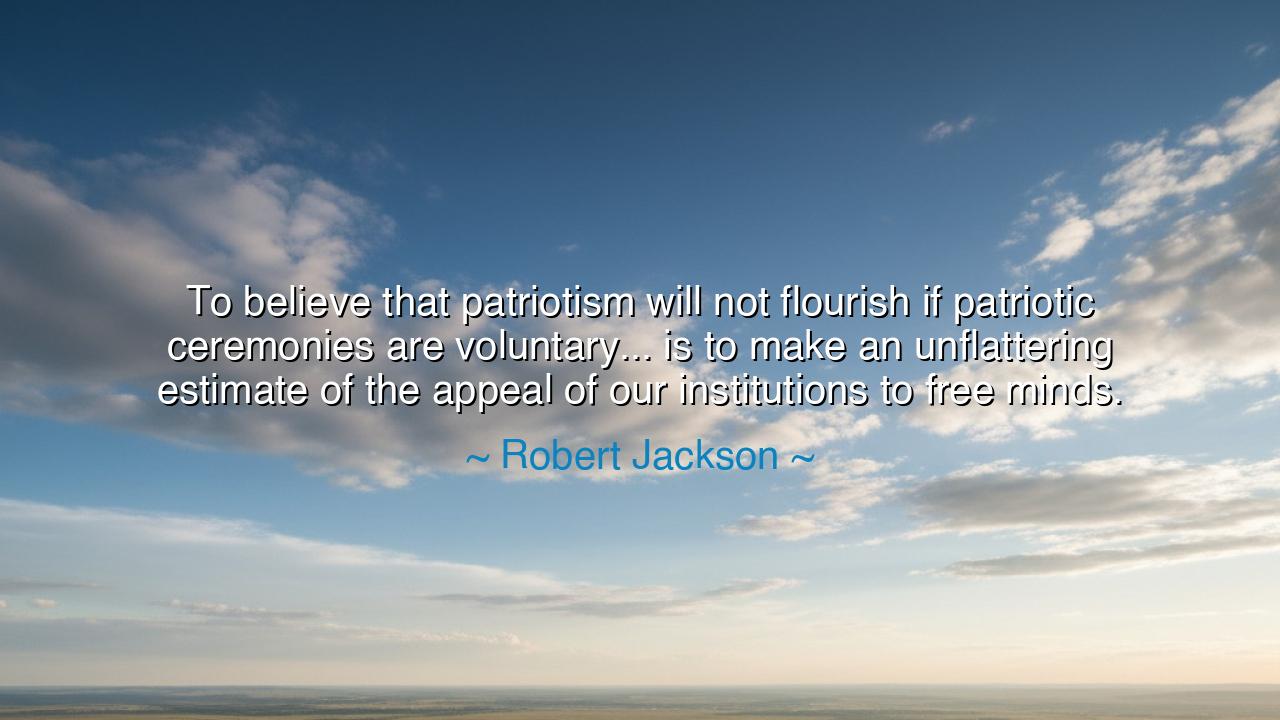
To believe that patriotism will not flourish if patriotic
To believe that patriotism will not flourish if patriotic ceremonies are voluntary... is to make an unflattering estimate of the appeal of our institutions to free minds.






The words of Robert Jackson—“To believe that patriotism will not flourish if patriotic ceremonies are voluntary... is to make an unflattering estimate of the appeal of our institutions to free minds.”—resound like the voice of a guardian of liberty speaking to generations yet unborn. Jackson, who served as a Justice of the United States Supreme Court, uttered these words in the shadow of the Second World War, when questions of freedom, loyalty, and national unity pressed heavily upon the nation. His wisdom reminds us that patriotism is not something to be coerced by ritual or forced by ceremony; rather, it springs freely from the hearts of a people who believe in the justice of their institutions and the righteousness of their freedoms.
At the heart of his declaration lies a profound truth: compulsion breeds hypocrisy, but freedom breeds sincerity. A flag salute that is forced is no true sign of loyalty, but a salute offered freely carries within it the fire of devotion. To imagine that ceremonies must be mandatory in order for patriotism to survive is, as Jackson declared, an insult to the very principles of liberty and democracy. For if our institutions are just, they will inspire loyalty without force; and if they are unjust, no amount of compulsion can make the heart love them.
History provides us with a vivid context for these words. In 1943, Jackson authored the majority opinion in West Virginia State Board of Education v. Barnette. The case asked whether children, including Jehovah’s Witnesses, could be compelled to salute the flag in school. Jackson declared that no official had the right to prescribe orthodoxy in politics, nationalism, or religion. His decision was a defense of freedom of conscience, affirming that true patriotism arises not from obedience imposed, but from conviction freely chosen. In this ruling, Jackson gave flesh to the ancient wisdom: that liberty is not threatened by voluntary devotion, but by enforced conformity.
Consider too the contrast with regimes that demanded compulsory loyalty. In Nazi Germany, the salute, the anthem, the flag ceremonies—these were not voluntary, but enforced with fear. Outwardly, patriotism seemed to flourish. But beneath the surface, it was brittle, hollow, built upon fear and conformity rather than belief. When the tyrant fell, the loyalty collapsed. By contrast, in America, even when ceremonies are voluntary, patriotism endures—for it is anchored not in fear of punishment, but in love of freedom.
The ancients understood this distinction well. In Athens, devotion to the polis was not commanded by ritual, but was cultivated by shared participation in the life of the city. The citizen who fought for Athens did so not because he was forced to praise it each morning, but because he believed in its ideals. In Rome, too, loyalty was strongest when citizens felt that the Republic respected their rights; when that respect vanished, patriotism decayed, even as rituals continued. Jackson’s teaching is thus the heir of this ancient wisdom: free minds give stronger allegiance than coerced ones.
The lesson for us is clear: patriotism must be nurtured by justice, not enforced by compulsion. If a nation is truly worthy of devotion, its people will give it freely. If its institutions are fair, they will inspire loyalty without being demanded. The task of leaders, then, is not to compel outward displays of pride, but to cultivate inward trust through righteousness and fairness. For when the institutions are strong and just, patriotism flourishes naturally, like a flower that grows without being forced to bloom.
In daily life, this means respecting freedom of conscience in others, even when they dissent from rituals or symbols we hold dear. It means ensuring that our communities and governments live up to the ideals that inspire voluntary loyalty: fairness, justice, equality, and liberty. It means understanding that the truest patriotism is quiet, voluntary, and sincere—not loud, coerced, or empty.
Thus let Jackson’s words echo in our hearts: do not fear that patriotism will die if ceremonies are free. Fear only if patriotism must be compelled. For a coerced loyalty is weak, but a chosen loyalty is unbreakable. Trust in the power of freedom, trust in the appeal of justice, and trust in the dignity of free minds—for it is from these that the true strength of a nation flows.






AAdministratorAdministrator
Welcome, honored guests. Please leave a comment, we will respond soon